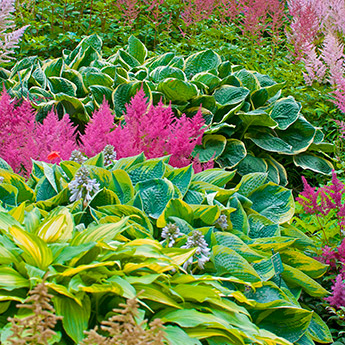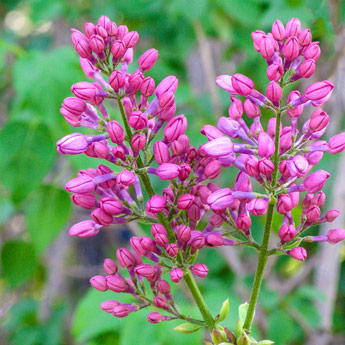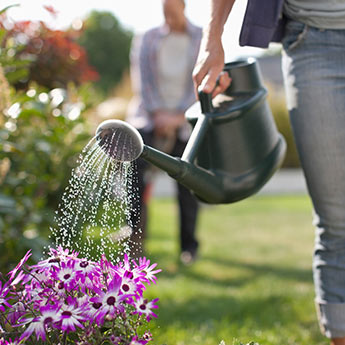Can Floating Goats Control Water Weeds?
Q. Roger, located "between Coopersburg and Limeport in the beautiful Lehigh Valley" writes: "I'm co-owner of a fishing lake in Eastern PA. About four years ago we were "invaded" by European water chestnut.
"I partially controlled the plants this summer using purely mechanical means--pulling them out with rakes and pitchforks while standing on home-built rafts. This plant, as you probably know, is an invasive species that has spread from New England down to Virginia. It makes fishing, and even boating, impossible as it grows thick in shallow, warm water; and the seeds are thorny.
"Do you know of an organic aquatic herbicide I can use to help control this species, as well as hydrilla and algae? I know that aquatic plants make excellent fertilizer for gardens. I'm using them in my garden. I offer them free to anyone willing to spend a pleasant hour or so on the lake collecting a bunch of it. I've collected tons and it breaks down rapidly when set out on dry land.
"I'm wondering--would it be irresponsible to feed this stuff to goats? And, what if I put goats on my rafts to eat the rosettes? I'd call this "goats on floats". As for now, it's just this old goat, me, enjoying being out on the lake on my supersized stand-up paddle boards. I know other lake owners, including the state parks in the area, are interested in your answer. Thanks for your time and I'll keep enjoying your program on NPR radio."
A. I love this question! Like many others, it sent me deep-diving into the research, which I love. But before we get to what I learned, let's start with first thoughts:
Fertilizer runoff: OK; fish poop and dead fishies are excellent fertilizers and support the growth of aquatic plants, both wanted and unwanted. We can't change that. But if nearby areas are treated with chemical fertilizers, the runoff feeds the bad plants; and that CAN be changed.
Boats: Before entering the water, they should be rinsed thoroughly with warm water or salt water to ensure that they're not introducing any new plant parts to the lake. And not just motorboats; kayaks, canoes and such should also be thoroughly cleaned.
Same is true on the back end. A washing station situated away from the lake should be used after the boating expedition, especially if the boater pushed through tangles of water plants.
OK; now: what can you do when the plants are already out of control?
These are tough weeds. When they cover the surface of a pond or lake, they cut off sunlight and oxygen, which promotes algae growth and kills fish and other lake dwellers that depend on a decent supply of oxygen in the water. And these plants spread and reproduce by virtually every means possible. I want to emphasize that I am far from an expert on this topic, but after MANY hours of research I'm willing to present a plan. God help us all.
First, mechanical removal. Rogers' work with pitchforks and rakes is the classic control method. But I would also urge him to check out the specialized rakes on the market that are designed specifically for water weed control; they could be great time savers. (And yes, goats will gleefully eat these weeds after they're deposited on land. And they'll gift you with a different form of fertilizer as well!)
Over the past decade motorized machines that cut and remove the existing growth of water weeds have become more available and affordable. Here's a great article about them.
The best DIY idea I came across was to remove the cloth from an old box spring mattress and drag it slowly behind a boat, stopping frequently to unload the harvest. Take pictures if you try this!
After the harvest, there are several organic biologicals on the market that can be applied to quickly degrade severed plant parts, rid the area of algae, make the water clear, and return oxygen levels to normal. Here's two that I found:
https://www.tlc-products.com/pond-treatment-lp?gclid=EAIaIQobChMI3tju5PPV-gIVIP7jBx0HpgFhEAAYAiAAEgLoevD_BwE
and
https://www.newtechbio.com/dead-algae-and-duckweed-digester.htm?gclid=EAIaIQobChMI3tju5PPV-gIVIP7jBx0HpgFhEAAYAyAAEgINEvD_BwE
Goats. I love goats! They are smart and love eating invasive plants. Here's a great article about them. Pay special attention to #13!
Enter Bruce Bradford of www.flockworks.us who was willing to answer my question: "Do goats swim?"
"Most of them don't" answered the professional herder of weed-eating goats in and around Cumberland County PA, "but there is a group that I call aquatic goats. These are generally the low-ranking goats in a herd and they will venture into water if the alpha goats keep them away from tasty plants like poison ivy."
In addition, young goats can be trained to be comfortable around water, but these specialized weed eaters need to be trained at an early age."
OK: What about goats on boats?
Bruce: "I love it! The boats need to be as large as possible and move slowly through the infested area. Many people would be interested in the results. I very well may be testing this in the future to see if any of our goats will graze on our invasive water lilies."
Interested? The website www.hiregoats.com has a great map that shows the location and contact information of weed eating goat herds for rent everywhere in the US.
"I partially controlled the plants this summer using purely mechanical means--pulling them out with rakes and pitchforks while standing on home-built rafts. This plant, as you probably know, is an invasive species that has spread from New England down to Virginia. It makes fishing, and even boating, impossible as it grows thick in shallow, warm water; and the seeds are thorny.
"Do you know of an organic aquatic herbicide I can use to help control this species, as well as hydrilla and algae? I know that aquatic plants make excellent fertilizer for gardens. I'm using them in my garden. I offer them free to anyone willing to spend a pleasant hour or so on the lake collecting a bunch of it. I've collected tons and it breaks down rapidly when set out on dry land.
"I'm wondering--would it be irresponsible to feed this stuff to goats? And, what if I put goats on my rafts to eat the rosettes? I'd call this "goats on floats". As for now, it's just this old goat, me, enjoying being out on the lake on my supersized stand-up paddle boards. I know other lake owners, including the state parks in the area, are interested in your answer. Thanks for your time and I'll keep enjoying your program on NPR radio."
A. I love this question! Like many others, it sent me deep-diving into the research, which I love. But before we get to what I learned, let's start with first thoughts:
Fertilizer runoff: OK; fish poop and dead fishies are excellent fertilizers and support the growth of aquatic plants, both wanted and unwanted. We can't change that. But if nearby areas are treated with chemical fertilizers, the runoff feeds the bad plants; and that CAN be changed.
Boats: Before entering the water, they should be rinsed thoroughly with warm water or salt water to ensure that they're not introducing any new plant parts to the lake. And not just motorboats; kayaks, canoes and such should also be thoroughly cleaned.
Same is true on the back end. A washing station situated away from the lake should be used after the boating expedition, especially if the boater pushed through tangles of water plants.
OK; now: what can you do when the plants are already out of control?
These are tough weeds. When they cover the surface of a pond or lake, they cut off sunlight and oxygen, which promotes algae growth and kills fish and other lake dwellers that depend on a decent supply of oxygen in the water. And these plants spread and reproduce by virtually every means possible. I want to emphasize that I am far from an expert on this topic, but after MANY hours of research I'm willing to present a plan. God help us all.
First, mechanical removal. Rogers' work with pitchforks and rakes is the classic control method. But I would also urge him to check out the specialized rakes on the market that are designed specifically for water weed control; they could be great time savers. (And yes, goats will gleefully eat these weeds after they're deposited on land. And they'll gift you with a different form of fertilizer as well!)
Over the past decade motorized machines that cut and remove the existing growth of water weeds have become more available and affordable. Here's a great article about them.
The best DIY idea I came across was to remove the cloth from an old box spring mattress and drag it slowly behind a boat, stopping frequently to unload the harvest. Take pictures if you try this!
After the harvest, there are several organic biologicals on the market that can be applied to quickly degrade severed plant parts, rid the area of algae, make the water clear, and return oxygen levels to normal. Here's two that I found:
https://www.tlc-products.com/pond-treatment-lp?gclid=EAIaIQobChMI3tju5PPV-gIVIP7jBx0HpgFhEAAYAiAAEgLoevD_BwE
and
https://www.newtechbio.com/dead-algae-and-duckweed-digester.htm?gclid=EAIaIQobChMI3tju5PPV-gIVIP7jBx0HpgFhEAAYAyAAEgINEvD_BwE
Goats. I love goats! They are smart and love eating invasive plants. Here's a great article about them. Pay special attention to #13!
Enter Bruce Bradford of www.flockworks.us who was willing to answer my question: "Do goats swim?"
"Most of them don't" answered the professional herder of weed-eating goats in and around Cumberland County PA, "but there is a group that I call aquatic goats. These are generally the low-ranking goats in a herd and they will venture into water if the alpha goats keep them away from tasty plants like poison ivy."
In addition, young goats can be trained to be comfortable around water, but these specialized weed eaters need to be trained at an early age."
OK: What about goats on boats?
Bruce: "I love it! The boats need to be as large as possible and move slowly through the infested area. Many people would be interested in the results. I very well may be testing this in the future to see if any of our goats will graze on our invasive water lilies."
Interested? The website www.hiregoats.com has a great map that shows the location and contact information of weed eating goat herds for rent everywhere in the US.







 Gardens Alive! & Supplies
Gardens Alive! & Supplies




